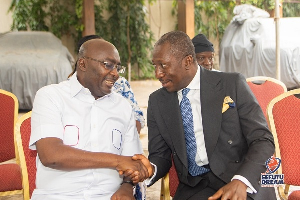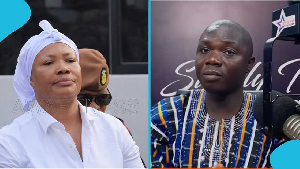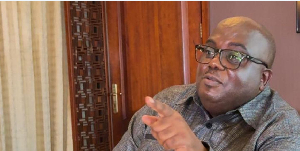By Ekwow Spio-Garbrah, former
Ambassador to the USA & Mexico
At his New Year’s Press Conference, H.E. President
John Evans Atta-Mills presented Ghana’s foreign policy stance on Cote d’Ivoire
as one which respects the territorial sovereignty of its neighbor, seeks to use
peaceful diplomatic means to resolve the ongoing electoral dispute, and puts a
priority on the interests of Ghanaians. President Atta-Mills also said in his
“personal opinion” he did not believe that military force will be beneficial in
resolving the conflict in Cote d’Ivoire and therefore was opposed to a military
invasion of Cote d’Ivoire. After the press conference many Ghanaians in Cote
d’Ivoire, those in many parts of Ghana, as well as in the Diaspora, breathed a
sigh of relief. Some dubbed the president’s wise stance a ‘dzi wo fie asem’ foreign
policy, in contrast to the George W. Bush-style “democracy-at-the-barrel-of-a-gun”
policy being promoted by the Akufo-Addo-led NPP.
Following President Atta-Mills’ statement, former
President Jerry John Rawlings, who is Ghana’s longest-serving head of state,
and whose tenure saw the preservation of peace in Ghana at a time when most of West
Africa was engulfed in crises, issued a statement in support of the government.
Former President John Agyekum Kufour, who also during his tenure sought to
douse the flames of war in Cote d’Ivoire, remained silent and refused to
criticize the cautious and wise policy of President Atta-Mills. But the
opposition New Patriotic Party (NPP), under the leadership of Nana Akufo-Addo,
has decided to mount their 2012 election campaign on a radical new non-African
doctrine that mimics the ‘George W. Bush-inspired democracy-at-the-barrel-of- a-gun
policy.’ The NPP has been telling Ghanaians that its new radical policy is
rather what has been truly the mainstay of Ghanaian foreign policy practice.
They argue that the measured, constitutionally and historically proper policy
of President Atta-Mills and the NDC government is misguided. Where does the NPP
get these notions from? The preamble to Ghana’s Constitution says it was adopted
“in a spirit of friendship and peace with all peoples of the world.”
Furthermore, Section 40 of Ghana Constitution’s
Principles of State Policy states that “in
its dealings with other nations, the Government shall (a) promote and protect
the interests of Ghana; (b) seek the establishment of a just and equitable
international economic and social order; (c) promote respect for international
law, treaty obligations and the settlement of international disputes by
peaceful means; (d) adhere to the principles enshrined in or as the
case may be, the aims and ideals of: i) the Charter of the United Nations; ii)
the Charter of the Organization of African Unity; iii) the Commonwealth; iv)
the Treaty of the Economic Community of West African States; and v) any other
international organization of which Ghana is a member.” Clearly the Constitutional
burden on President Atta-Mills is FIRSTLY “to promote and protect the interests
of Ghana” before seeking “to promote respect for international law, treaty
obligations and the settlement of international disputes by peaceful means.” So if
anyone has to go back and re-read their
constitution, it’s the NPP and its conspicuously befuddled leader Nana Akufo-Addo.
The same New Patriotic Party (NPP), which in the
1960s called for a “constructive engagement” with Apartheid South Africa, today
calls for war on our neighbor Cote d’Ivoire to resolve a simple internal electoral
dispute. Such a reckless gun-toting policy of the NPP will not be faithful to
the Ghana Constitution or be keeping with either the theory or practice of
international relations. One would have expected that since the NPP is now led
by a former foreign minister of Ghana the NPP would have played a more
constructive role in Ghana’s foreign policy formulation and practice at such a
critical time. Unfortunately, the Akufo-Addo-led NPP has shown that it lacks
the balanced judgment and seasoned equipoise in foreign affairs matters that even
the Kufour-led NPP generally showed.
The oath which Prof. Atta-Mills took when he was
sworn as President in January 2009 was not to defend the territorial integrity
of Cote d’Ivoire or the foreign policy aims of Nigeria, Benin, Sierra Leone or
other West African states, but to defend Ghana and Ghanaians no matter where
they reside. The Presidential Oath of Allegiance enjoins President
Atta-Mills to “bear
true faith and allegiance to the Republic of Ghana as by law established; [and]
uphold the sovereignty and integrity of Ghana; and preserve, protect and defend
the Constitution of the Republic of Ghana.”
Does the NPP want the president to disregard his
oath and ignore the prospect of a potential reprisal attack on the nearly 1
million Ghanaians who live in Cote d’Ivoire? Is the NPP not aware that already
marauding militias are roaming the streets of Abidjan and have been accused by
the UN of even killing armed peacekeepers? Is the NPP not aware that Ghana’s
Jubilee oil fields is just a stone throw away from the Ivoirian border and
could be attacked if Ghana invades Cote d’Ivoire? Is the NPP willing to levy new
taxes to
collect the hundreds of millions of dollars that Ghana will need to properly
deploy its military to Cote d’Ivoire? Is the NPP not aware that the ECOMOG
deployment to Liberia in the early 1990s was a major financial drain on Ghana’s
finances and that the international community only came in much later to
relieve the situation? Is the NPP ready with measures to contain the massive
humanitarian catastrophe that could occur in Cote d’Ivoire if a military
invasion triggers a civil war? Is the NPP not aware that Ghana already has more
than 400 of its soldiers in Cote d’Ivoire under UNOCI command? Is that not
enough of a contribution from Ghana, when there are more than 100 UN member
countries that could also contribute troops to enhance the UN presence there?
President Atta-Mills has chosen a wise policy
and we all as Ghanaians should be grateful that at such a critical time in our
history we have ‘Nana Asomdweehene I’
as our president who is cool headed and
wise enough to not plunge the country into a senseless war with its neighbors.
ECOWAS, at its December 24, 2010 Extraordinary
Summit, issued a communiqué N°: 192/2010 which stated inter alia that: “(9).The
Heads of State and Government regret the
fact that the message sent by the ECOWAS Chairman on behalf of the Authority on
17 December 2010 has not been headed by Mr. Gbagbo. In this season of peace,
the Summit decided to make an ultimate gesture to Mr. Gbagbo by urging him to
make a peaceful exit. In this regard, the Authority decided to dispatch a
special high-level delegation to Côte d’Ivoire. (10). In the event that Mr.
Gbagbo fails to heed this immutable demand of ECOWAS, the Community would be
left with no alternative but to take other measures, including the use of legitimate
force, to
achieve the goals of the Ivorian people.” A simple textual analysis of
the communiqué clearly shows that ECOWAS
did not say it will invade Cote d’Ivoire to impose democracy as the NPP claims,
but it simply aggregated and
reconciled the views of all
the presidents present at that summit (viz - H. E. Thomas Boni Yayi, President of
the Republic of Benin; H. E.
Blaise Compaore, President of Burkina Faso; H. E. Pedro Verona Rodrigues Pires,
President of the Republic of Cape Verde; H. E. John Evans Atta-Mills, President
of the Republic of Ghana;H. E. Malam Bacai Sanhá, President of the Republic of
Guinea Bissau; H. E. Ellen Johnson-Sirleaf, President of the Republic of Liberia;
H. E. Ebele Goodluck Jonathan, President of the Federal Republic of Nigeria; H.
E. Maître Abdoulaye Wade, President of the Republic of Senegal; H. E.
Ernest Bai Koroma, President of the
Republic of Sierra Leone; H. E. Faure Essozimna Gnassingbe, President of the
Togolese Republic; H. E. Mamadou Tangara, Minister of Foreign Affairs,
International Cooperation and Gambians Abroad, representing the President of
the Republic of the Gambia; H. E. Moctar Ouane, Minister of Foreign Affairs and
International Cooperation, representing the President of the Republic of Mali).
It is clear from the
ECOWAS resolution that while legitimate force was contemplated, it was also
seen as a very last resort. Nor did
the ECOWAS Resolution imply that unless Ghana specifically sent additional
troops under an ECOWAS/ECOMOG command, ECOWAS could not act. So for the NPP to
say that President Atta-Mills contradicted himself in his New Year News
conference is to misunderstand the modern practice of foreign policy as opposed
to some archaic textbook theories of foreign policy which clearly the NPP wants
Ghana to endure, even if it will lead to the deaths of hundreds of Ghanaians in
Cote d’Ivoire and threaten our oil fields. ECOWAS mediators led by Ghana’s
distinguished diplomat, James Victor Gbeho, in his capacity as ECOWAS
Commission President, are still in Abidjan seeking all peaceful means to
resolve the conflict. The AU-appointed mediator, Kenyan Prime Minister Raila
Odinga, has tried shuttle diplomacy in an effort to ease the crisis. But, even
before all negotiations could be
said to have failed, the NPP wants President Atta-Mills to declare war on our
neighbor. Before Ghanaian troops are deployed
anywhere President Atta-Mills is required by Article 214 (1) of the Constitution to
consult the “The Armed
Forces Council [which] shall advise the President on matters of policy relating
to defense and strategy including the role of the Armed Forces.” President
Atta-Mills says he has consulted
the Armed Forces Council and they have advised him against an invasion. Does
the NPP want the president to violate the Constitution? Does the NPP want the
president to commit an impeachable offense? Where in the treaty setting up the
Economic Community of West African States does it require all its members to
form a mini NATO to invade fellow African countries?
My interest in Cote d’Ivoire spans more than three decades. I first
visited Cote d’Ivoire in 1976. My wife’s father is from Cote d’Ivoire, her
mother is from Cape Verde and she herself was born in Senegal. My children are
true ECOWAS nationals, being part Anglophone, part Francophone and part
Lusophone. I also had the privilege, like many Ghanaians who have worked at the
African Development Bank, to live and work in Abidjan for years. I therefore
have some understanding of the Ivorian mind-set and the country’s current
socio-political crises. Indeed, I know personally many of the actors involved
in the current Ivoirian crisis. Also, as a former Ghanaian diplomat myself, it
would be unconscionable for me to sit unconcerned for the NPP to goad Ghana
into a needless, reckless and potentially tragic war. The Ivoirian crisis is
not one which should lead to the suffering of its entire population. If
President Gbagbo can be persuaded to give up power, and given whatever
assurances he needs, the entire crisis can end peacefully. Of course, if
President Gbagbo continues to be uncooperative, the international community has
a battery of other non-war instruments—economic, financial, trade, immigration,
legal, communication-- to compel him to lose power and exit. The military
option always exists for the UN and ECOWAS, but it cannot be Ghana’s unilateral
priority.
For me, as it is for countless other Ghanaians living across the border
in the Western, Brong Ahafo, Northern and Upper West regions, the crisis in
Cote d’Ivoire has a personal dimension with the lives of many extended
relatives at stake and therefore requiring not mere textbook theory.
The President and the NDC government are absolutely right on this matter!
The NDC and ordinary Ghanaians are grateful for the government’s wisdom. Please
ignore the barrel-of-a-gun policy of the NPP. President Kufour please re-educate
your party leaders on how to apply wisdom in foreign policy matters.
By Ekwow Spio-Garbrah, former
Opinions of Friday, 28 January 2011
Columnist: Spio-Garbrah, Ekwow
Atta-Mills Is Right On Cote D’ivoire
Opinions













